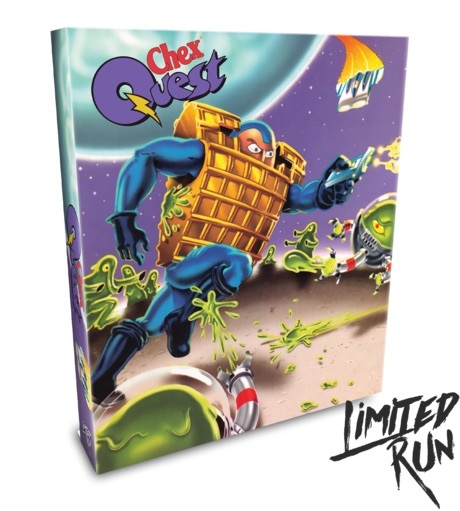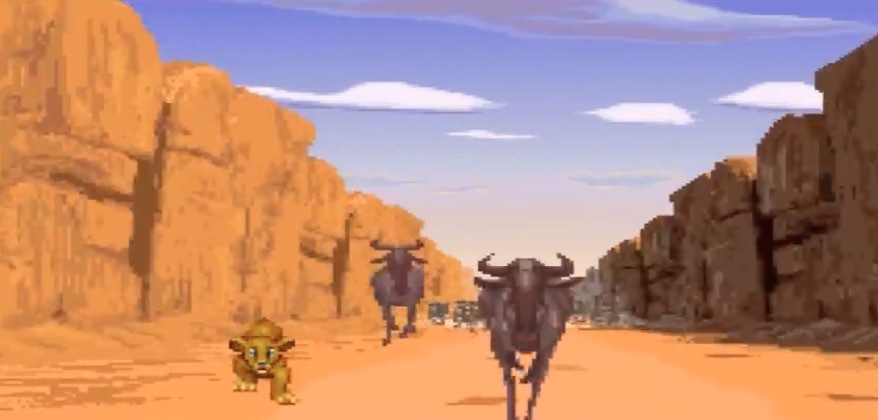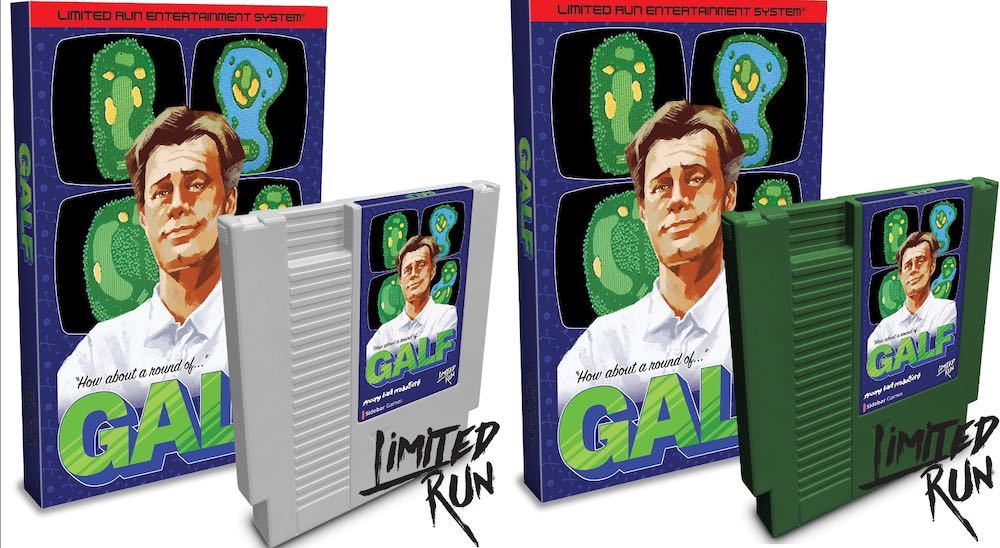(Note: This post contains spoilers for Playdead's Inside.)
When publisher Limited Run Games first revealed the $150 "Chex Warrior" edition of the infamous 1996 shooter Chex Quest--a free total conversion of Doom originally distributed in boxes of the eponymous cereal--reaction ran the gamut from strained confusion to outright enthusiasm. While it might seem like a bizarre tribute to an advertising relic of the '90s, Limited Run's founder Josh Fairhurst offered a simple explanation for the move: He just really liked Chex Quest as a kid.
"There are definitely times where I take a gamble on something that I think is really cool with the knowledge that it may not make money," he says. "Chex Quest is a great example of that."

Limited Run's core business of providing physical releases for traditionally digitally-minded indie games grew out of such a gamble. When Fairhurst's game studio Mighty Rabbit was in financial trouble, he leveraged the last of the studio's funds and took out a loan to create a small run of physical copies for their Vita game Breach & Clear. Though Fairhurst hoped that the studio would make at least enough money to continue operating off the production, he also had a personal reason for the decision. "It felt right for me to take a game that I had made and make it physical, because if my company went out of business, at least having that physical game would be a reminder that hey, we actually did things," he explains. "Our hard work wouldn't be lost to the march of time, or services getting shut down."
When that production run sold out in a scant two hours, however, Fairhurst realized he had stumbled across a lucrative new business model, and Limited Run has grown from there to over 500 releases in under five years. The majority of the company's output remains physical releases of hit indie games like Streets of Rage 4 or reissues of classics like Star Wars Jedi Knight 2: Jedi Outcast, and Fairhurst is absolutely clear that the success of these less-risky projects allows the company to indulge its more offbeat impulses from time to time. These dalliances sometimes only break even--in particular, Fairhurst says Limited Run's PC releases have a tendency to do less well than their console counterparts--but they can also prove to be unexpected successes.
Over the past five years, there's been a significant shift in the way that many people buy and consume games. The statistics tell the story: In the first half of 2019, Sony reported that digital sales of retail games had finally eclipsed physical purchases 53% to 47%, around the same time that GamesIndustry.biz reported that several regions in Europe now purchase a majority of their games digitally. While these numbers seem to suggest a gradual move away from physical copies of games, the reality is that there exists a market of die-hard collectors who covet limited editions and gewgaws that serve as tokens of their undying fandom.

Lately, however, some of the small companies that put out these expansive physical editions have been greenlighting unconventional or unusual projects in an attempt to stand out in the market. The results are a fascinating reflection of what sort of games get to be regarded as "classics," as well as what kinds of goodies fans are hoping for when they plonk down hundreds of dollars for a special edition of a beloved game. However, the very nature of these limited editions can sometimes cause unruly fans to react with vitriol when they fail to snap up the package they want--and the results can be quite unpleasant.
When Electronic Arts approached Limited Run about doing a limited edition of Command & Conquer Remastered Collection, as a longtime fan of the franchise, Fairhurst was enthusiastic about tackling it. However, given that the series hasn't had a major entry since 2012, he was concerned that the production run might only break even. Instead, fans flocked to it in droves, and it ended up becoming Limited Run's top-selling item of all time. To Fairhurst, the whole episode demonstrated an important lesson: It's impossible to know how fans will react to these sorts of announcements, so it's best to go with what you personally enjoy.
"I would say there's a strong gut component to what we're doing," he says. "Most of the time, an opportunity will come our way, and we'll be able to look at the name and just think, well, it'll likely at least break even, and if it ends up being profitable, that's great."
Jon Gibson of fellow boutique publisher iam8bit prefers a different metaphor: He calls their decision-making process "a sort of alchemy." Born out of a 2005 art show that served as a gallery space for artists obsessed with the intersection of '80s pop culture and old-school gaming, Gibson says that iam8bit focuses on creating merch that is interpretive and respectful rather than simply "regurgitating" an existing brand.

Last year, iam8bit partnered with RealDolls--yes, the California-based company that makes so-called "love dolls," which are lauded by enthusiasts for their human-like verisimilitude--to produce one of the most bizarre pieces of video game merch ever devised: A silicone model of the monstrous, amorphous "Huddle" from the end of the 2014 horror game Inside.
According to iam8bit's co-owner, Amanda White, the idea of putting together a rubber or silicone model for one of their collector's editions actually predates Inside entirely. For years now, she's been trying to collaborate with friends who work at Sinvention, a Canadian company that specializes in high-end bondage gear and other sex toys. Her associate suggested Realdolls as the ultimate in "silicone artisans," and the partnership ended up producing the model that fans could buy for $375.
"I definitely still think there's a market for a video game-related sex toy," Gibson says, laughing. "We're going to find the right project for that someday." (Whether Rez's infamous "trance vibrator" counts as a pioneer in the field depends on who you ask.)
Not every one of iam8bit's releases can be as outlandish as that, but Gibson says they do try to push the boundaries as much as they can, if only quietly. He says that fans often question their inclusion of Genesis games Aladdin and The Lion King in their Legacy Cartridge Collection, since movie tie-in games are largely considered subpar at best among enthusiasts. In Gibson's opinion, however, these two games are historically important, because they represent the first time that game developers were able to collaborate with filmmakers before the movies being adapted even came out, rather than slapping a game together based on secondhand knowledge and assets.

"Lion King was a technical marvel in its day," Gibson says. "Just look at the parallaxing in the Simba's stampede sequence. That's an amazing feat of gameplay engineering. Achieving that in the crunched time-frame of a movie game is very impressive... It doesn't matter if these games are rare, they are seminal pieces of gaming history, they were important to the evolution of the industry, just in a way that isn't as appreciated as Street Fighter 2 or Mega Man 2."
Both Gibson and Fairhurst say they often get complaints about the price of their reproduction cartridges, which sometimes come in at more than $100. Though Fairhurst says he doesn't necessarily blame younger fans for balking at the price, he points out that small batches of high-quality cartridges are expensive to produce, often coming in at up to $25 per cart, and that doesn't include packaging or any extras. (As many retro gamers will tell you, that's why some cartridge games would retail for $70 or $80 back in the day.)
Fairhurst personally feels that some customers have a tendency to hold grudges against the company based on experiences with it they had years ago. For example, when Limited Run partnered with a developer to create a limited edition for the infamous FMV slasher Night Trap, it made a very limited quantity, assured that the demand for a game that regularly shows up on "worst of all time" lists would be mild at best. Instead, Night Trap sold out in less than a minute.
"I definitely still think there's a market for a video game-related sex toy. We're going to find the right project for that someday."
"People still hold that against us," he says. "We get hate messages about it to this day. They hate us with a burning passion. People don't understand that we've changed our model, that our runs aren't as limited anymore, that most of our games are sold on a pre-order model, but they still hate us because they missed out on Night Trap."
Both companies say the ire of collectors can gather on the most surprising of shores. Gibson and White were caught up in the toxic firestorm that surrounded the original release of No Man's Sky, and a mob of aggrieved gamers sent them negative messages, as well as death threats.
"The product resonated with fans; we sold a ton of those statues and collector's editions," Gibson says. "But we got really nasty phone calls. They thought that we were a proxy for the developer. It really turned Amanda and me off humanity for a bit, I'll say that."

Meanwhile, Fairhurst says he received quite a bit of hate mail from customers seeking the fake NES game Galf that the company included with the Switch version of the sports RPG Golf Story. Based on a mini-game from Golf Story itself, Fairhurst describes it as "essentially a joke version of NES Golf." "You can get a copy of that on eBay for $5," he says, laughing. "To be so upset about what is essentially a clone of that game with some weird humor in it, that to me is next-level. It's unfortunately not that unusual, though."
Though Fairhurst says he's never quite sure what will be the next offbeat collector's edition his company comes out, he has one in mind that will eclipse them all: the abysmal 3DO game Plumbers Don't Wear Ties, a semi-pornographic visual novel that you might describe as the video game equivalent of a slightly-smutty PowerPoint presentation.
"I've been trying to get the rights to that game for like three to four years now," he says. "I'd like to bring it to Switch and PS4, and do an elaborate collector's edition, because it's such a morbid curiosity. People need to see how awful it is."
